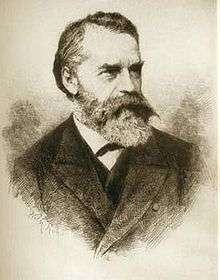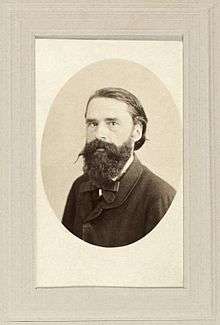Ferdinand Gregorovius
Ferdinand Gregorovius (19 January 1821, Neidenburg, East Prussia, Kingdom of Prussia – 1 May 1891, Munich, Kingdom of Bavaria) was a German historian who specialized in the medieval history of Rome.[1]


Biography
Gregorovius was the son of Neidenburg district justice council Ferdinand Timotheus Gregorovius and his wife Wilhelmine Charlotte Dorothea Kausch. Gregorovius family members lived for over 300 years in Prussia and had many jurist, preachers and artists. One famous ancestor of Ferdinand's was Johann Adam Gregorovius, born 1681 in Johannisburg, district of Gumbinnen. An earlier ancestor named Grzegorzewski had come to Prussia from Poland.
Ferdinand Gregorovius was born at Neidenburg, East Prussia (now Nidzica, Poland), and studied theology and philosophy at the University of Königsberg. In 1838, he joined the Corps Masovia. After teaching for many years, Gregorovius took up residence in Italy in 1852, remaining in that country for over twenty years. In 1876, he was made honorary citizen of Rome, the first German to be awarded this honor. A street and a square are named after him. He eventually returned to Germany, where he died in Munich.
He is best known for Wanderjahre in Italien, his account of the travels on foot that he took through Italy in the 1850s, and the monumental Die Geschichte der Stadt Rom im Mittelalter (History of Rome in the Middle Ages), a classic for Medieval and early Renaissance history. He also wrote biographies of Pope Alexander VI and Lucrezia Borgia, as well as works on Byzantine history and medieval Athens, and translated Italian authors into German, among them Giovanni Melis. According to Jesuit Father John Hardon, S.J. Gregorovius was "a bitter enemy of the popes."[2]
Works
- Der Ghetto und die Juden in Rom, Mit Einem Geleitwort von Leo Baeck, Im Schocken Verlag/Berlin, 1935 (originally published, 1853)
- Der Tod des Tiberius ("Tiberius' Death", 1851)
- Geschichte des römischen Kaisers Hadrian und seiner Zeit ("History of the Roman Emperor Hadrian and His Times", 1851)
- The Emperor Hadrian (1898 translation by Mary E. Robinson)
- Siciliana (1853)
- Corsica (1854);[3] Corsica (1855 trans. by Edward Joy Morris)
- Göthe’s Wilhelm Meister in seinen socialistischen Elementen entwickelt. Schwäbisch Hall: E. Fischhaber, 1855.
- Geschichte der Stadt Rom im Mittelalter (1859–1872) Translated into English 'The History of Rome in the Middle Ages' (1894–1902). (reissued by Italica Press, 2000–2004.); (reissued by Cambridge University Press, 2010. ISBN 978-1-108-01513-4)
- Wanderjahre in Italien (1856–1877)
- Die Insel Capri (1868); The island of Capri (1879 trans. by Lilian Clarke)
- Geschichte der Stadt Athen im Mittelalter. Von der Zeit Justinians bis zur türkischen Eroberung ("History of Athens in the Middle Ages. From Justinian to the Turkish Conquest", 1889)
- Lucretia Borgia und ihre Zeit (Lucrezia Borgia: a chapter from the morals of the Italian Renaissance, 1874)
- Die Grabmäler der Römischen Päpste (The Tombs of The Roman Popes), first edition 1857 in German (Google books link), later in 1881 as Die Grabdenkmäler der Päpste (The Tombs of The Popes) (Open Library link) and in English as The Tombs of the Popes (tr: Louisa W. Terry) Victoria Press, Rome 1904 (Google books link)
- Die Insel Capri. Idylle vom Mittelmeer (1897)
Notes
- Münz, Sigmund (1892). "Ferdinand Gregorovius". English Historical Review: 697–704. doi:10.1093/ehr/VII.XXVIII.697.
- Hardon, John (1998). "IV. Recognizing the True Church". Christ to Catholicism. InterMirifica. Retrieved 2008-01-02. External link in
|publisher=(help) - "Review of Corsica by Ferdinand Gregorovius". The London Quarterly Review: 134–143. January 1855.
External links
- Works by Ferdinand Gregorovius at Project Gutenberg
- Works by or about Ferdinand Gregorovius at Internet Archive
- Works by Ferdinand Gregorovius at LibriVox (public domain audiobooks)

- Works by Ferdinand Gregorovius at Open Library
- Ferdinand Gregorovius
- Latian Summers (1903 English translation of part of Wanderjahre in Italien)